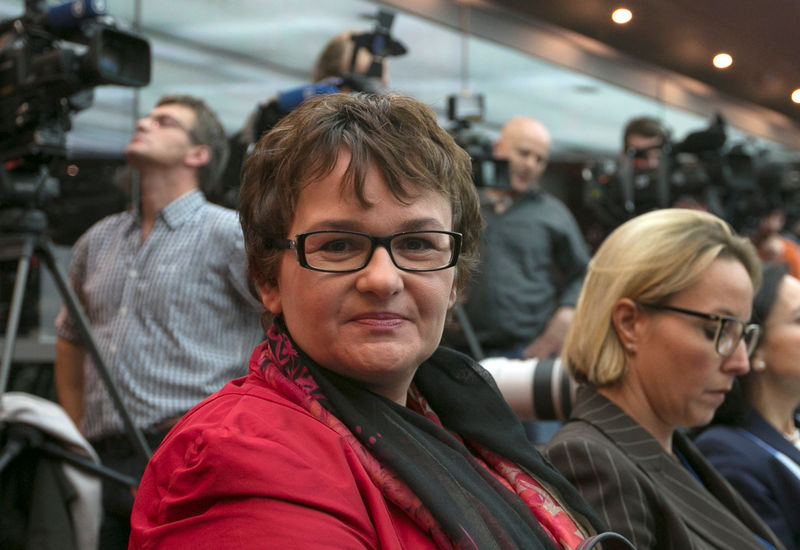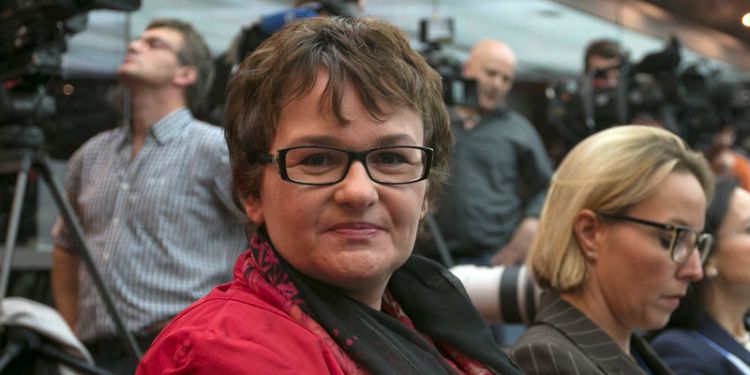 © Reuters. FILE PHOTO: European Central Bank (ECB) executive board member Lautenschlaeger attends at a news conference at the ECB in Frankfurt
© Reuters. FILE PHOTO: European Central Bank (ECB) executive board member Lautenschlaeger attends at a news conference at the ECB in FrankfurtBy Balazs Koranyi and Francesco Canepa
FRANKFURT (Reuters) – A key euro zone banking supervision role is set to go unfilled for an indefinite time after ECB chief Mario Draghi failed to pick a successor in an unprecedented impasse at the crucial euro zone institution, sources familiar with the matter said.
Sabine Lautenchslaeger’s five-year term as vice-chair of the ECB’s Single Supervisory Mechanism, which oversees 119 of the euro zone’s biggest banks, runs out on Feb. 11. A successor has yet to be proposed, exposing a rift on the ECB board.
The dual role she fills, combining bank supervisor and ECB board member, provides a vital link between watchdogs and rate-setters. An extended vacancy could reduce ECB policymakers’ insight into the health of lenders at a sensitive time.
Euro zone growth is at its slowest in half a decade, and ECB rate-setters are discussing whether lenders need fresh long-term loans to keep cheap credit flowing to the real economy, while their banking supervision colleagues are still trying to rid the sector of unpaid credit inherited from the last crisis.
The job must be filled by one of the ECB’s six board members. Two directors – Yves Mersch and Vice President Luis de Guindos – have put their hands up, four sources with direct knowledge of the process told Reuters.
But Draghi had issues with both and instead hoped Lautenschlaeger would stay on in the job, possibly for a shorter stint, the sources said.
But she has insisted it is time to move on after a difficult five years in which she helped set up the supervisor, one of the EU’s newest institutions.
“We knew for five years to the day when Sabine’s term would expire,” one of the sources said. “Even if Draghi proposed a new candidate today, the confirmation could take six weeks.”
When asked at a recent news conference if an announcement was coming, Draghi said “you’ll know it soon.” But the official transcript of the event omitted the word “soon”.
An ECB spokesman said the transcript omission was an unintentional error but otherwise declined to comment.
Policymakers could have proposed a candidate this week but the Governing Council meeting was canceled, suggesting that Draghi was still not ready to make his pick.
TOUGH DECISION
One policymaker, who spoke on condition of anonymity, said Draghi did not want the Governing Council to put pressure on him before he was ready to select someone.
De Guindos, a former politician, was seen as lacking the supervisory experience and as ECB vice president already has plenty of responsibilities, the sources said.
As vice chair of the Single Supervisory Mechanism he could also find himself in a legally awkward position of having to fill in for the ECB president, so in his two separate capacities he would be both above and below bank supervisory chief Andrea Enria in the hierarchy.
Mersch, meanwhile, does not have five years left on his term and he is known to have had a tense relationship with Draghi, the sources said.
Supervisors set capital requirements for lenders and set various guidelines, such as on reducing non-performing loans, making the vice chair’s job a powerful role in European banking.
ECB rules do not allow Lautenschlaeger to serve a second term, although the ECB has the power to change its own rules. Still, it could be a contentious move to change this clause before its first application, the sources added.
While she could still change her mind and stay on, sources said she’s showing no signs of wavering.
Lautenschlaeger also expressed frustration with the ECB’s decision late last year to pick a man to head the supervision arm when Irish central banker Sharon Donnery was seen as an equally qualified candidate.
With 23 men on the ECB’s 25-member Governing Council, the bank has been criticized by European lawmakers for having too few women in leading roles.
Just months ago, the top two positions at the supervision arm were held by women but with Lautenschlaeger’s departure, both would be replaced with men.
Source: Investing.com




























